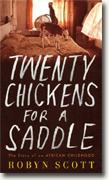Twenty Chickens for a Saddle
Robyn Scott
book reviews:
· general fiction
· chick lit/romance
· sci-fi/fantasy
· graphic novels
· nonfiction
· audio books
· author interviews
· children's books @
curledupkids.com
· DVD reviews @
curledupdvd.com
newsletter
win books
buy online
links
home
for authors
& publishers
for reviewers

 |
Twenty Chickens for a Saddle: The Story of an African Childhood Robyn Scott The Penguin Press Hardcover 464 pages March 2008 |
|
Twenty Chickens for a Saddle
For much of the author’s childhood, the Scott family lives in a small, revitalized cow shed (in the middle of nowhere) and later moves to its own farm (in the middle of nowhere) where they build a more substantial, larger house. They have friends; they see people. But mostly they have each other – and a variety of creatures, large and small. Early on, the children learn from the parents and grandparents not to even kill moths. Living in their home –or in its vicinity - at various times are several dogs, old and young horses( in a variety of humors and trainability) and all kinds and sizes of snakes (some harmless, some not). A close neighbor at their farm is a huge crocodile, whom they affectionately name Fiddian. Said croc once ate two cows who got too close for comfort. These creatures make up as much of the Scotts’ community as did humans. Life for the author and her siblings seems idyllic and full of adventure. One of my favorite passages inspires the book’s title: Robyn needs a new riding saddle but needs to earn money to buy it. She decides to adopt 20 former battery (factory-raised) chickens, let them loose, give them a good life, and sell the first in the area’s free-range eggs. This plan works amazingly well. The chickens are ecstatic to feel dust and dirt under their tiny feet, and the eggs pay for most of her saddle. ”They had, of course, never even stood on soil, let along had the space in which to really scratch… all twenty of these scrawny one-year-old chickens still knew exactly what to do.” But a terribly serious aspect looms as the three children become teenagers. The first case of AIDS hits Botswana in 1985. In Dr. Scott’s practice, approximately 50 percent of his patients develop symptoms. One quarter of the country’s population develops the disease. Many people have multiple sex partners; many men refuse to use condoms. Babies are born with AIDS and, at its onset, no educational campaigns or drugs or natural remedies exist. The Scotts’ lives all become involved with the epidemic and its ramifications - all hoping for cures, all reeling from its immensity. The epidemic aside, this memoir is touching, hilarious in parts, and captivating as it is so different than most American readers’ experience and/or conception of childhood. This memoir provides the reader with a breath of exotic fresh air. Originally published on Curled Up With A Good Book at www.curledup.com. © Deborah Straw, 2008 |
|
|
|
 Click here to learn more about this month's sponsor! |
|
| fiction · sf/f · comic books · nonfiction · audio newsletter · free book contest · buy books online review index · links · · authors & publishers reviewers |
|
| site by ELBO Computing Resources, Inc. | |
 Memoirs are so trendy these days; it seems everyone has dirty laundry to air
- “My childhood was worse than yours. Look at me, I’m still surviving,” etc. Not so this author. Although certainly her family was quite odd, she seldom criticizes anyone and, except for her father, no one holds a grudge for long. The family is loving and congenial. Scott tells her stories in chronological order in a somewhat deadpan voice, no matter how amazing or foreign the adventure or misadventure may be to her Western readers. Another good thing about this memoir is that the Scott family is white and shows no prejudice or superiority toward people or traditions whatsoever. This is not true of a few of the other local white people toward the native predominantly black population.
Memoirs are so trendy these days; it seems everyone has dirty laundry to air
- “My childhood was worse than yours. Look at me, I’m still surviving,” etc. Not so this author. Although certainly her family was quite odd, she seldom criticizes anyone and, except for her father, no one holds a grudge for long. The family is loving and congenial. Scott tells her stories in chronological order in a somewhat deadpan voice, no matter how amazing or foreign the adventure or misadventure may be to her Western readers. Another good thing about this memoir is that the Scott family is white and shows no prejudice or superiority toward people or traditions whatsoever. This is not true of a few of the other local white people toward the native predominantly black population.